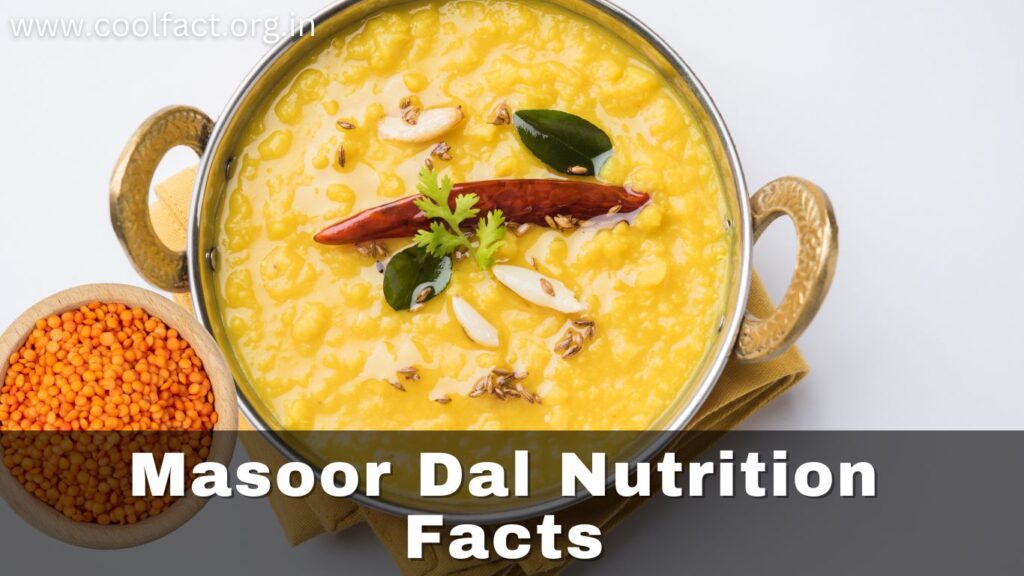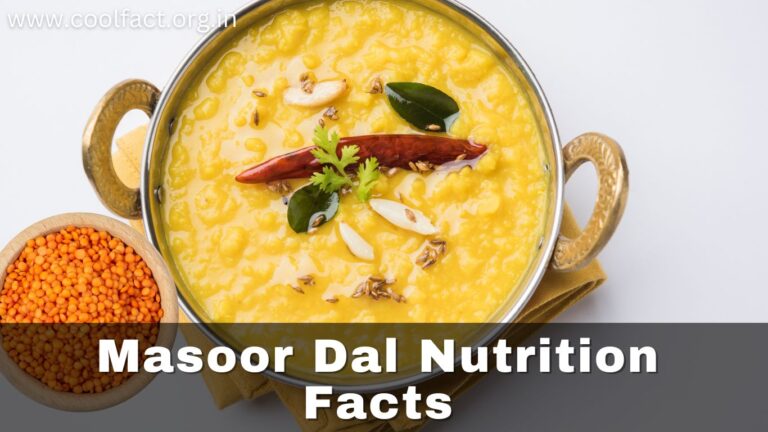Masoor Dal Nutrition Facts: Masoor dal, additionally accepted as red lentils, is an abdomen basic in abounding households, and for an acceptable reason! This apprehensive legume is not alone affordable and accessible to baker but additionally awash with capital nutrients that can drag your health. Whether you’re whipping up an abating basin of dal or applying it to adorn your curries, masoor dal is an able and alimental ingredient.
In this blog post, we’ll dive deep into the nutrition facts of masoor dal, explore its incredible health benefits, and share exciting ways to incorporate it into your daily meals.

Nutritional Value (Per 100g): Masoor Dal Nutrition Facts
| Nutrient | Amount |
|---|---|
| Calories | 352 kcal |
| Protein | 24 g |
| Carbohydrates | 60 g |
| Dietary Fiber | 8 g |
| Fat | 1.5 g |
| Iron | 7.5 mg |
| Calcium | 55 mg |
| Potassium | 680 mg |
| Magnesium | 47 mg |
| Vitamin B6 | 0.4 mg |
3 Science-Backed Reasons to Highlight the Importance of Protein
1. Promotes Muscle Growth and Repair
Masoor dal is an excellent plant-based protein source that supports muscle building and recovery, making it ideal for vegetarians and vegans.
2. Supports Metabolic Health
Protein in masoor dal helps stabilize blood sugar levels and promotes a healthy metabolism, reducing the risk of diabetes.
3. Enhances Immunity
Amino acids from protein in masoor dal play a crucial role in the production of antibodies, strengthening your immune system.
10 Health Benefits of Masoor Dal
1. Rich Source of Protein
Masoor dal is a protein-packed legume, provides essential amino acids that are vital for overall growth and development.
2. Aids in Weight Management
Its high fiber content keeps you full for longer, curbing hunger and supporting weight loss goals.
3. Promotes Heart Health
Masoor dal is low in fat and contains potassium and magnesium, which help regulate blood pressure and reduce bad cholesterol levels.
4. Boosts Digestive Health
The fiber in masoor dal promotes gut health by preventing constipation and supporting the growth of beneficial gut bacteria.
5. Regulates Blood Sugar
Its low glycemic index ensures a slow release of glucose, making it a great choice for diabetics.
6. Strengthens Bones
Loaded with calcium and phosphorus, masoor dal helps maintain bone density and prevents osteoporosis.
7. Improves Skin Health
Masoor dal contains iron and antioxidants, which improve blood circulation and give your skin a natural glow.
8. Enhances Energy Levels
Rich in complex carbohydrates, it provides a steady energy supply, keeping you active throughout the day.
9. Supports Eye Health
The vitamin A and carotenoids in masoor dal contribute to better vision and reduce the risk of macular degeneration.
10. Environmentally Sustainable
Choosing plant-based proteins like masoor dal helps reduce environmental impact, making it a planet-friendly food choice.
5 Delicious Ways to Incorporate Masoor Dal into Your Diet
1. Classic Masoor Dal Curry
A hearty, spiced curry made with masoor dal is perfect for pairing with rice or roti.
2. Lentil Soup
Blend cooked masoor dal with vegetables and spices for a creamy, protein-packed soup.
3. Dal Paratha
Use cooked masoor dal as a filling for stuffed flatbreads for a nutritious twist.
4. Salads and Buddha Bowls
Toss boiled masoor dal with fresh veggies, lemon juice, and olive oil for a protein-rich salad.
5. Masoor Dal Pancakes
Mix soaked and ground masoor dal with spices to make savory pancakes or dosas.
Top 5 FAQs: Masoor Dal Nutrition Facts
1. Is masoor dal suitable for weight loss?
Yes! Its high protein and fiber content help control appetite and support weight management.
2. Can diabetics eat masoor dal?
Absolutely! Its low glycemic index makes it a safe and beneficial option for people with diabetes.
3. Does masoor dal cause bloating?
If consumed in excess or without proper cooking, it may cause bloating. Soaking and thoroughly cooking it can minimize this issue.
4. Is masoor dal good for children?
Yes, it’s an excellent source of protein and nutrients essential for growing children.
5. How long can cooked masoor dal be stored?
Cooked masoor dal can be stored in an airtight container in the refrigerator for up to 3 days.
Conclusion: Masoor Dal Nutrition Facts
Masoor Dal Nutrition Facts: Masoor dal is a comestible assertive that deserves an atom in your diet. From its aerial protein agreeable to its abundant bloom benefits, it’s an able and adorable additive that caters to assorted comestible needs. Whether you’re interested to addition your protein intake, advancing affection health, or adore a wholesome meal, masoor dal is the absolute choice.
For more exciting food facts and nutrition tips, visit coolfact.org.in. Stay healthy, explore new recipes, and make the most of this superfood!
